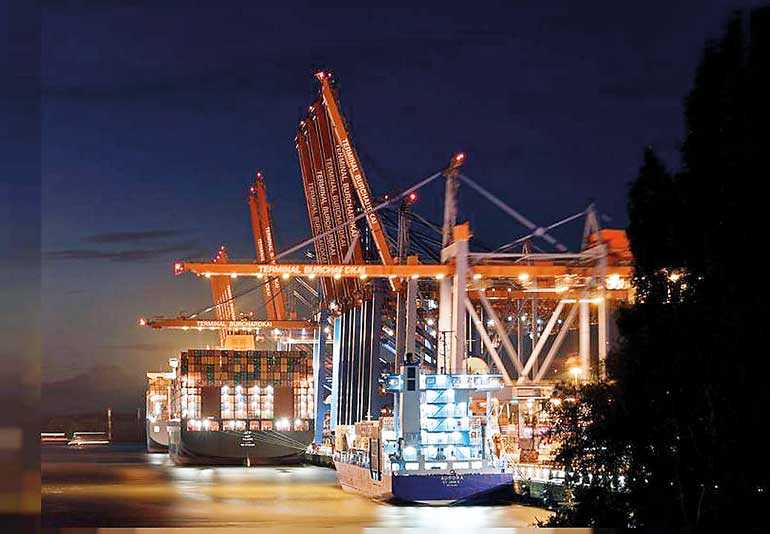Monday Feb 16, 2026
Monday Feb 16, 2026
Tuesday, 12 November 2019 00:00 - - {{hitsCtrl.values.hits}}

Container ships are loaded at a loading terminal in the port of Hamburg Germany October 28, 2019. Picture taken - Reuters
BERLIN (Reuters): For three decades, China’s burgeoning demand for German cars, machines and engineering tools has been a steady engine of growth for Europe’s largest economy, gratefully championed by successive governments in Berlin.
But the engine is starting to splutter. China’s economy is slowing, Donald Trump’s “America First” policies are hurting global trade and China’s factories are becoming rivals to the German giants that once supplied them.
The slowdown is not helping at a challenging time for Germany. Its economy contracted 0.1% in the second quarter and some analysts expect third-quarter gross domestic product (GDP) data due on Nov. 14 to show a similar decline – which would leave the economy in recession for the first time since 2013.
While German trade with China is only a small part of the country’s 3.4 trillion euro (3.8 trillion) economy, it has been one of the few components of GDP that Berlin could count on to grow year after year.
Now, with growth in Chinese demand for goods “Made In Germany” ebbing, and by some measures falling, the once lucrative export market is proving less supportive as the economy stagnates.
“China is our most important trading partner but the future trend is hard to predict,” said Axel Mattern, a senior manager at the Port of Hamburg, where there are signs China’s slowdown and Sino-U.S. rifts are putting a brake on trade.
While it is too early to call the demise of the Sino-German trading relationship, the cooling of its red-hot growth has rekindled doubts about whether years of ever-closer economic ties have helped Germany.
Some industrialists say politicians who looked past human rights abuses in China in the hope trade would turn the Asian country into a Western-style state with an open economy and equal market access were deluded.
“That turned out to be wishful thinking,” said the Federation of German Industry’s (BDI) Stefan Mair, a leading advocate for a more pragmatic German policy towards China.
Growth downgrades
When the Berlin Wall fell in 1989, Sino-German trade was tiny. As Beijing embraced globalisation, China’s share of German exports soared from 0.6% in 1990 to 7.1% last year. In 2016, China overtook the United States to become Germany’s biggest trading partner, and it still is.
Over the years, the relationship helped Germany shake off its 1990s reputation as “the sick man of Europe” and recover from the global financial crisis much faster than others.
Carmakers BMW and Volkswagen, industrial giants such as Siemens and Germany’s “Mittelstand”, the smaller companies that form the backbone of the economy, have all benefited.
Following the approach of her predecessor Gerhard Schroeder in the early 2000s, Chancellor Angela Merkel has set aside concerns over China’s record on human rights and intellectual property to court its leadership for business. In September, she completed her 13th trip to China in 14 years.
Since the 2008-09 financial crisis, German exports to China have grown every year except 2015 - and last fell prior to that in 1997 - hitting a record 93 billion euros in 2018. But even before Trump’s dispute with China, growth had started to recede, from 13.3% in 2017 to 8% in 2018 to 2.7% in the first nine months of 2019, according to official German data.
Home in on the recent months and the trend appears starker.
Chinese customs data shows imports from Germany fell 3.6% in August from the same month last year and 9.2% in September. Cumulatively, the Chinese data shows imports from Germany fell 2% during the first nine months of 2019.
The International Monetary Fund downgraded its growth forecast for Germany’s economy last month to 0.5% in 2019 and 1.2% in 2020, saying in its World Economic Outlook that weaker Chinese demand was one factor behind a broader slowdown in industrial output, along with the fallout from trade tensions.
The Association of German Chambers of Industry and Commerce (DIHK) also cited the Sino-US dispute and the broader cooling of China’s economy as factors behind its prediction that overall German exports would fall next year for the first time since the financial crisis.